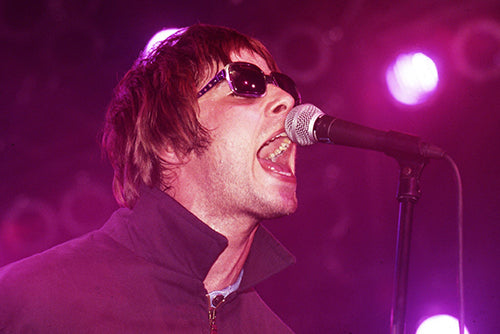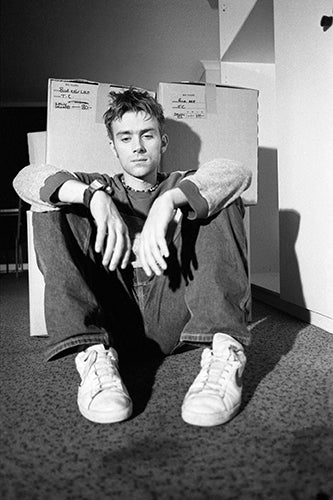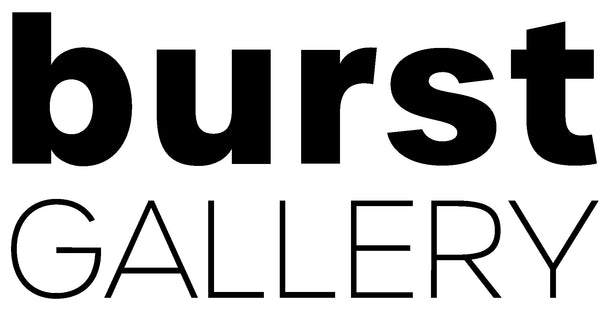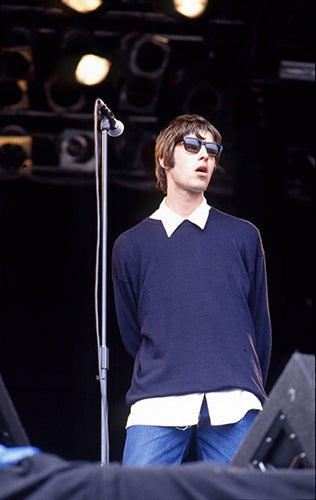The Nineties was the decade that saw Britain get its mojo back. For a few years, the Union Jack was an icon to be celebrated, mercifully-free of any racist overtones, and it quickly became the emblem for Cool Britannia. Union Jack bedsheets, Union Jack dresses, Union Jack cars, Union Jack guitars – the Union Jack was everywhere, its bright red, white and blue seeming to capture an air of optimism and change. New Labour was changing the way we looked at politicians, Zoe Ball and Sarah Cox were changing the way women were viewed and Britpop was changing the way we listened to music.
The history of Britpop is littered with events that helped to define one of the most exciting and influential eras in British music. Here are Burst Gallery’s top 10 that charted its rise and fall.
1.The Death of Kurt Cobain
The late Eighties and early Nineties saw a new brand of rock winging its way from Seattle, to the shores of the UK. Known as ‘grunge’, it was a fusion of alt-rock, punk and metal and took the British airwaves by storm. The biggest of all the grunge bands was Nirvana, fronted by the songwriter, Kurt Cobain. Formed in 1987, Nirvana reached their greatest commercial success in around 1992.
However, Cobain saw Nirvana’s achievements as founded in compromise. While he undoubtedly suffered from his own, personal demons, he also had a singularly idealistic view of the true cost to art, from business. His suicide note began with noting the truth behind “all the warnings from all the 101 punk rock courses over the years” and how he struggled to reconcile the “ethics involved with independence.”
But what has Kurt Cobain’s death got to do with the history of Britpop? Although grunge’s flame was starting to flicker, Cobain’s suicide put it out for most UK fans. Luke Haines, of The Auteurs, said that “no-one wanted to think about rock stars blowing their brains out.” A British musical scene was already starting to make ripples on UK radio waves and the tragic end of Cobain’s life signalled that it was time for something new. Just scant weeks after his death, the upbeat jangle of Britpop guitars replaced the heavy, angst-ridden furrows ploughed by grunge bands.
2. Creation Records signs Oasis

Liam Gallagher at the Electric Ballroom in Camden, 1996. Click the image to find out more and buy.
Creation Records was formed in 1983, on the back of a £1,000 loan taken out by Alan McGee. By the end of the Eighties, this small-but-mighty label had signed the likes of The Jesus and Mary Chain, Primal Scream, Ride, and the Boo Radleys.
However, Creation hadn’t enjoyed much in the way of success, beyond Ride’s hit single, ‘Leave Them All Behind’ and Primal Scream winning the Mercury Music Prize, with ‘Movin’ On Up’. Fast forward to 1993, and that would all change.
Until then, Oasis had been a pubs and clubs band, first going under the name of ‘The Rain’ and then changing to Oasis, after Liam Gallagher joined as lead vocalist. He was followed by his older brother, Noel, who quickly established himself as the group’s songwriter-in-residence and lead guitarist.
Fellow rehearsal room renters, Sister Lovers, invited the Manchester band to play support for them at a gig at the now-legendary King Tut’s Wah Wah Hut, in Glasgow. As Fate would have it, Alan McGee was there to see one of his own bands at work, 18 Wheeler. After having to convince King Tut’s doormen that they were on the line-up, Oasis played the opening slot and McGee immediately offered them a record contract. Although the band didn’t sign until a few months later, this was to be their first step towards becoming one of the main players in the history of Britpop.
3. Select and Suede take a Swipe at the States
Select was one of music’s best-loved magazines during the Nineties and was, arguably, the first to coin the term, Britpop. As the interest in grunge and American music in general began to wane, Select went on the offensive. An article by Stuart Maconie championed the burgeoning change in the UK music scene, declaring that instead of the downcast fashion and music spearheaded by the likes of Nirvana, “we want crimplene, glamour, wit, and irony.”
The cover of April 1993’s issue of Select featured Brett Anderson, of Suede, posing behind the headline, ‘Yanks go home!’. The British music press had nailed its colours to the mast and was cheerfully setting all the pieces in place for a musical ‘Battle for Britain’.
A year later, Anderson would deny any jingoistic sensibilities, stating that “it’s tasteless superimposing someone in front of any flag. It was almost like I was saying “Yanks go home!”. I would never say anything as idiotic as that”. However, under the auspices of the music press, Britpop had cemented its position on the shores of Blighty.
4. Weller Comes Back from the Wilderness
The Britpop era saw young musicians picking up their instruments and microphones and paying homage to their musical heroes. While Blur was picking up where The Kinks left off, Oasis was busy making sure that The Beatles’ flame continued to burn bright.
However, few bands embodied the ‘up yours’ spirit of the Sixties and the Seventies as The Jam. Fronted by Paul Weller, the group set out as a punk band, but found themselves synonymous with the revival of the Mod movement, between 1965 and 1978.
After disbanding The Jam and briefly flirting with soul during his Style Council years, Weller went on something of a sabbatical. The birth of Britpop and Jam-influenced bands, such as The Charlatans, Supergrass and Suede, saw him returning with a new, retro style that borrowed the best of the Swinging Sixties and took it in another direction. Hailed by his younger contemporaries as ‘The Modfather of Britpop’, Weller came back from the wilderness, with albums such as Wild Wood and Stanley Road, both of which were acclaimed as a return to form.
During the Britpop years, Weller struck up friendships with a number of the major players of the music scene – most famously with Noel Gallagher, who persuaded him to play keyboards on the Oasis B-side, Talk Tonight.
A dyed-in-the-wool Englishman, Weller’s musical credibility helped to cement Britpop as a UK phenomenon.
5. Britpop gets The Bends
For those who weren’t there, the history of Britpop can sound like it was knee-deep in nostalgia. However, beyond Blur and Oasis, other bands were riding the resurgent wave of interest in British music and taking things in a decidedly different direction.
Formed in 1985, Radiohead didn’t achieve any notable success until the release of their first single, in 1992. ‘Creep’ and their debut album, Pablo Honey, paved the way for their ground-breaking second outing, The Bends.
Released in 1995, The Bends eschewed catchy hooks and swaggering guitar lines, in favour of creating a sonic soundscape that few were going to dance to, but many could relate to.
Drawing on krautrock, alt-rock, loops and peerless technical musicianship, Radiohead created an album that dealt with the themes of disaffection, isolation and backed it up with melancholy melodies that flew in the face of the bouncier Britpop bands. Songs, such as High and Dry, Black Star and Bullet Proof…I Wish I Was, gave a voice to those who were looking beyond the bucket hats and parkas, for something that reflected their feeling of alienation.
6. Oasis v Blur

Damon Albarn backstage at Wembley Arena 1995. Click on the image to find out more and buy this print.
For many, Britpop was a game of two halves. Just like The Beatles and The Rolling Stones before them, the music press found two bands, each of which were vying to be the face of Britpop and pitted them against each other.
According to Alan McGee, the gauntlet may well have been thrown down by Oasis’ lead singer, Liam Gallagher. Until 1995, the two bands had tolerated each other’s existence, with Liam graciously declaring at that year’s NME Awards that “I don’t think we should have got more than Blur. Blur are a top band.”
Put the needle back on the record two months later and ‘Our Kid’ was playing a very different tune. On the back of Some Might Say charting at Number One, a party was held in the Mars Bar Club, in Covent Garden. Blur’s lead singer, Damon Albarn, lead-singer, had been invited and turned up to congratulate the Gallaghers and the rest of the band.
McGee says that “Liam went up to Damon saying, ‘We’re Number One, you’re not, you’re not’ and Damon got on one about it and decided to take Oasis on. Oasis, being Oasis, decided to hate them. And Blur, being Blur, thought it was a game.”
That game was to last through each of the bands’ respective careers, resulting in some spectacular mud-slinging through the press and culminating in a musical face-off, when both Blur and Oasis released their latest singles on the same day.
7. I Should Coco
While Oasis and Blur fought the Battle of Britpop through the charts and the press, other bands were sneaking under the radar. By 1995, many of the bigger bands had established themselves, replacing their initial everyman charm with more bombastic tunes; the perfect moment for a jauntier sound to stake its claim.
Supergrass was formed in 1993, by Gaz Coombes, Danny Goffey, Mick Quinn and joined later by Rob Coombes. Their first album, I Should Coco, provided the perfect antidote to the overblown excesses of their longer-serving peers.
Their fourth single, Alright, was a runaway success, chirping cheerfully on about the day-to-day escapades and adventures clocked-up by the young and optimistic. Part of Supergrass’ appeal was that they eschewed expensive production values and orchestral arrangements in favour of a stripped-back, garage rock stew that sniffed out the best bits of punk, glam rock and psychedelia to create a sound that was effortlessly upbeat, but with an element of dirt under its fingernails.
I Should Coco sold around 500,000 copies in the UK and more than 1million, across the globe. In addition, it scooped the Best Album Prize at the Mercury Awards and Alright won the Ivor Novello Award for the Best Contemporary Song of 1995.
8. Richey Edwards Goes Missing
Although they weren’t strictly a Britpop band, the Manic Street Preachers were a formidable force during the height of the Nineties. Albums such as Gold Against The Soul and The Holy Bible set them up as one of the greatest rock bands of that decade, with their political and common-man lyrics drawing comparisons with pop giants, U2.
On the 1st February 1995, the band’s songwriter and rhythm guitarist, Richey Edwards, went missing. All that is known is that, on that morning, Edwards checked out of the Embassy Hotel in London and drove to Wales, crossing the Severn Bridge. His car was found at the Severn View motorway services, two weeks later.
The remaining members of the Manics considered disbanding but decided to continue. Although there have since been anecdotal sightings of Edwards, he was declared dead in absentia, in November 2008.
9. The Pitch Perfect Britpop Battle?
One of the strangest events in the history of Britpop didn’t take place over the airwaves or through the music press. Instead, it took place on a football pitch.
On May 12th, 1996, the major players in the Britpop scene (aided and abetted by a few newcomers) took to the pitch at Mile End Stadium to settle old scores and raise money for charity. Of all the playoffs, the most anticipated was the one between Blur and Oasis. Oasis made up their numbers with ex-Take That singer, Robbie Williams and Pulp frontman, Jarvis Cocker.
Blur won their match, but the overall tournament was won by new kids on the block, Reef.
10. Knebworth
If the end of the Sixties was heralded by the ill-fated Rolling Stones’ concert at The Almont Speedway Free Festival, Britpop ran out of steam at Knebworth.
In August 1996, Oasis staged two record-breaking shows in the grounds of the legendary rock venue, Knebworth House. By this point, they were riding the tsunami of success created by the album, (What’s The Story) Morning Glory, and were on their way to recording their third, Be Here Now.
Previously, attendance records were held by the likes of Led Zeppelin and The New Barbarians. However, around 2.5million people applied for tickets to see Oasis, over two nights, with only capacity for around 125,000 at each concert.
The scale of the gig was unprecedented, with an estimated 7,000 people on the guestlist and 3,000 crew members. Over the course of the festival, the band was supported by the likes of the Manic Street Preachers, The Charlatans and Kula Shaker.
While it might have rung the final bell for Britpop, the Knebworth concert remains one of the most important concerts of that decade. As Noel Gallagher said to the crowd on the first night: “You’re making history, you lot.”
That’s our round-up of the defining moments in the history of Britpop. Were you there? If you lived through that heady time, drop Burst Gallery a line with anything you think we’ve missed.


